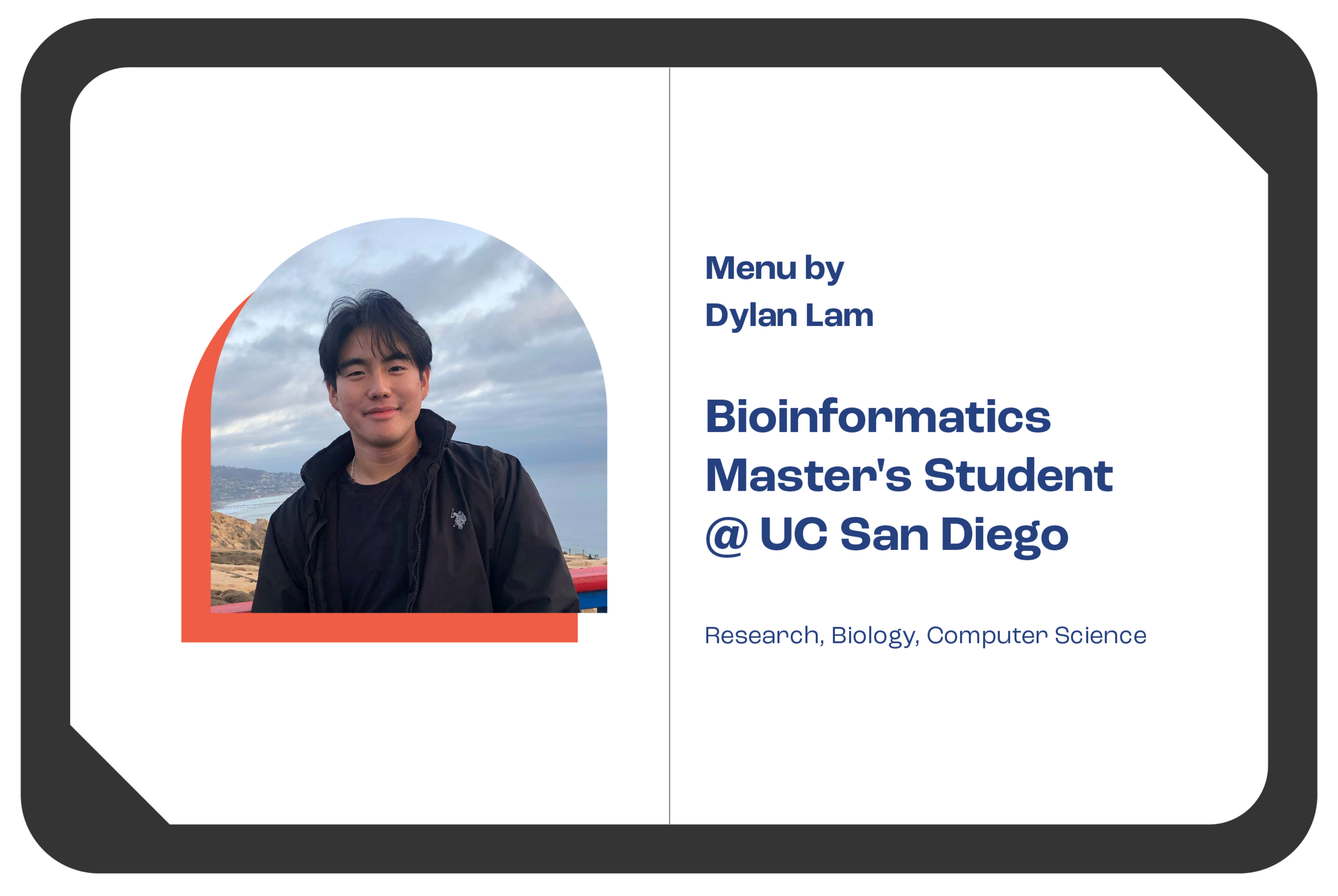
Tasting Room > Graduate School Program Table > Dylan Lam
Interview conducted in March 2022
Appetizers
Starting with some basics.
Grad Program
UC San Diego M.S. (1st year)
Undergrad Education
UC San Diego, Bachelor’s Biology with Specialization in Bioinformatics
Areas of Expertise
Research, Biology, Computer Science
Myers-Briggs personality type
ENTJ
Fun Starters
Getting to know the human side.
Favorite dessert?
Cookies and Cream Ice Cream
Favorite book or movie?
Favorite Book: Red Rising
Favorite Movie: Inception
What do you like to do for fun?
Weightlifting, traveling, trying new food
What's one thing you recommend doing in your city in San Diego, California?
My favorite thing to do in San Diego is to eat fresh seafood especially from Hawaiian Fresh Seafood while visiting one of the beautiful beaches.
Main Course
A quick deep dive into the day-to-day student life.
Tell us about yourself and what you're studying.
I am a 1st year Master's student in the contiguous BS/MS program at UCSD under the guidance of Eugene Yeo. My research area is in RNA biology, computer vision, and the uprising field of spatial transcriptomics.
The main project I am working on is the development of a program to perform segmentation on images of neurons differentiated from stem cells. The neuron segmentation can be used to perform RNA localization analyses after undergoing any spatial transcriptomics protocol.
How did you end up in your field? What do you like about it?
My interest in biology started in high school when I attended Stanford's summer research program, SIMR, and growing up in the Silicon Valley exposed me to a lot of computer science.
I applied to college as a premed student but quickly realized that I enjoyed developing biotechnologies more than working with patients. I then interned at Complete Genomics, a whole genome sequencing company, and then Eli Lilly, a pharmaceutical company, where I worked on the development and optimization of Next Generation Sequencing workflows.
When searching for labs to complete my MS, I searched for a similar biotechnology development project and came across the field of spatial transcriptomics which aims to identify the location and profile of RNA transcripts within single cells or tissue slices. I love that I am able to apply previous lab experiences and computer science concepts to build a program from scratch that can be applied to all the novel spatial transcriptomics workflows which have been appearing in recent years.
What classes are you taking right now? Which is your favorite and why?
The classes I am taking include Web Mining and Recommender Systems and Personal Genomics. The Web Mining and Recommender Systems gave me a great introduction to Machine Learning basics and how to use interaction data to predict future actions or recommend similar items.
I hope to one day apply the concepts I learned in this class to biology; For example, using RNA colocalizations to predict the movement of transcripts within a cell. I have not started the Personal Genomics class yet but I hope to learn more about how we can cater data analyses based on an individual’s personal genome.
I am also curious to see how we can use personal genomic data points to perform whole population genomic studies.
Let's say the school day just started, what's a typical morning look like?
A typical morning starts off with me going to the lab. I usually divide my days into wet lab days or dry lab days.
On a wet lab day, I spend my time culturing neurons and optimizing culturing techniques that help me produce clean neuron images to be segmented.
On dry lab days, I spend my time developing the code that is able to trace individual neurons and identifying edge cases that need to be addressed when applying the algorithms to real images.
Cool, then what does a typical afternoon look like?
In the afternoon, I usually attend course lectures or have meetings with lab members to discuss the various parts of our project.
Depending on what part of my project I am working on that day, I may have to continue culturing or coding throughout the afternoon.
How are your classes/exams and how do you keep up? How many hours per week do you spend studying or doing assignments?
My classes and exams are actually not as intense as I expected. My program allows me to choose between taking more classes or focusing more time on research.
I choose to spend more time on the latter since my project involves both wet and dry lab work. Because of this, I am able to take one course a quarter and I only spend about 10 hours a week working on assignments or studying for my classes.
Dessert
Now for some juicy insights in the tea room.
What's the most challenging thing about your grad program?
The most challenging thing about my grad program is the fact that I have to finish my research project and write a thesis in order to graduate. Performing research is always a roller coaster of successes and failures and it is easy to feel like nothing is going right when my experiments don't go well or my code doesn't perform as expected.
However, one thing I learned from doing research is that failures are actually the best ways to move closer towards a working product. They force me to rethink and work around the issues that arise and point my work in the right direction.
What are some characteristics that help someone succeed in your grad program specifically?
I think perseverance, creativity, and problem-solving are very important to succeed in a Master's program. Since it is a shorter program, there is an unavoidable need to produce a successful project quickly. This means once you have a solid idea, working hard and persevering to make it a reality is very important.
When problems arise, it is important to think creatively and outside the box to find solutions to those problems. Even if the concept of your project is feasible in theory, there will always be unexpected issues that arise. The way you are able to address those issues will determine whether or not you will be successful in your project.
Any advice on how to stand out and get into your grad program for those just starting off?
The best way to get into a biology MS program is to find a lab or opportunity that will give you a good foundation in the way research is conducted. This can include basic wet lab skills (pipetting, gel electrophoresis, PCR, etc.), reading research papers, or just understanding how a lab is operated.
If you have these basic skills and understandings, finding a lab to conduct graduate research in is much easier. When a lab sees a student that needs minimal training and is able to use their skills to perform research independently, they are more likely to take him or her as a graduate student.
Also, being a part of your target lab for a while before you request to be a graduate student helps a lot. Establishing good connections within the lab makes it easier for the principal investigator to vouch for you when you apply as a graduate student. Besides that, actively emailing or networking with professors or graduate students is also very useful.
What's something that surprised you about grad school?
The flexibility that my MS program allowed me was something that surprised me. I didn't expect so much freedom in what aspects of the program I wanted to focus on.
As I mentioned above, I am able to choose between taking more classes or focusing more on research. In terms of classes, I am able to take graduate courses from any department as long as it is approved by my lab's principal investigator.
For my research project, I am able to perform research in whatever project I find interesting as long as my lab has resources and guidance to help me make that project a reality.
What do you see your next step being?
In the upcoming years, the biggest decision for me is whether to pursue a higher graduate degree or transition into working in the biotech industry. Right now I am leaning towards the industry.
Since my project is in an up-and-coming industry and there are many start-up companies appearing, I am hoping my work and expertise will allow their technologies to adapt to neuroscience research.
Any last thoughts, advice, or recommendations for someone who wants to get into your grad program?
A lot of my colleagues feel that they are not prepared to go to a graduate school and take on their own research projects even after they have completed their undergraduate studies. But I think I surprised myself when I started my graduate program.
I realized that I learned a lot more than I thought I did as an undergraduate and going to grad school was the best way for me to learn how to apply my knowledge. Since graduate projects are based on the student and the research areas they want to pursue, I think it is a great way to discover what topics you enjoy and what career you want to commit to in the future.






